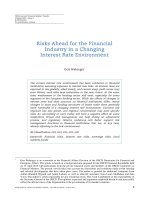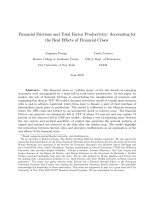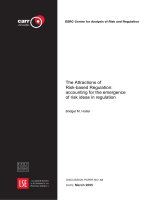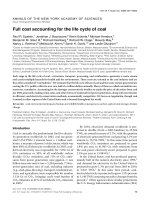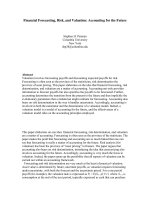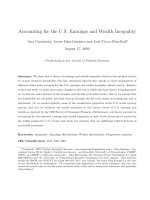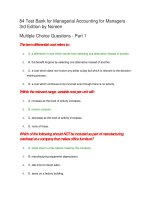Lecture Managerial Accounting for the hospitality industry: Chapter 11 - Dopson, Hayes
Bạn đang xem bản rút gọn của tài liệu. Xem và tải ngay bản đầy đủ của tài liệu tại đây (498.78 KB, 72 trang )
Chapter 11
Budgeting and Internal
Controls
© 2009 John Wiley & Sons
Hoboken, NJ 07030
1
Managerial Accounting for the Hospitality Industry
Dopson & Hayes
Chapter Outline
The Importance of Budgets
Types of Budgets
Operations Budget Essentials
Developing an Operations Budget
Monitoring an Operations Budget
Cash Budgeting
Managing Budgets through Internal Controls
© 2009 John Wiley & Sons
Hoboken, NJ 07030
2
Managerial Accounting for the Hospitality Industry
Dopson & Hayes
Learning Outcomes
Identify the purposes for the various types of budgets
used in the hospitality industry.
Create an operations budget and monitor its
effectiveness.
Create a cash budget.
Identify the characteristics of a successful internal
control program.
© 2009 John Wiley & Sons
Hoboken, NJ 07030
3
Managerial Accounting for the Hospitality Industry
Dopson & Hayes
The Importance of Budgets
Just as the income statement tells a managerial
accountant about past performance, the budget, or
financial plan, is developed to help you achieve your
future goals.
In effect, the budget tells you what must be done if
predetermined profit and cost objectives are to be met.
Without such a plan, you must guess about how much
to spend and how much sales you should anticipate.
Effective managers build their budgets, monitor them
closely, modify them when necessary, and achieve their
desired results.
© 2009 John Wiley & Sons
Hoboken, NJ 07030
4
Managerial Accounting for the Hospitality Industry
Dopson & Hayes
The Importance of Budgets
While each organization may approach budgeting from
its own perspectives and within its own guidelines, a
budget is generally produced by:
1. Establishing realistic financial goals of the
organization
2. Developing a budget (financial plan) to achieve the
objectives
3. Comparing actual operating results with planned
results
4. Taking corrective action, if needed, to modify
operational procedures and/or modify the financial
plan
© 2009 John Wiley & Sons
Hoboken, NJ 07030
5
Managerial Accounting for the Hospitality Industry
Dopson & Hayes
The Importance of Budgets
The advantages of preparing and using a budget are
summarized in Figure 11.1.
Budgeting is best done by the entire management team,
for it is only through participation in the process that the
whole organization will feel compelled to support the
budget’s implementation.
In large organizations, a variety of individuals will be
involved in the budgeting process.
© 2009 John Wiley & Sons
Hoboken, NJ 07030
6
Managerial Accounting for the Hospitality Industry
Dopson & Hayes
Figure 11.1 Advantages of Preparing and Using a Budget
1. It is an excellent means of analyzing alternative courses of action and allows
management to examine these alternatives prior to adopting a particular one.
2. It requires managers to examine the facts regarding what is necessary to
achieve desired profit levels.
3. It provides managers defined standards used to develop and enforce
appropriate cost control systems.
4. It allows managers to anticipate and prepare for future business conditions.
5. It helps managers periodically carry out a self-evaluation of the organization
and its progress toward its financial objectives.
6. It provides a communication channel whereby the organization’s objectives
are passed along to its various constituencies, including owners, investors,
managers, and staff.
7. It encourages department managers who have participated in the preparation
of the budget to establish their own operating objectives and evaluation
techniques and tools.
8. It provides managers with reasonable estimates of future expense levels and
thus serves as an important aid in determining appropriate selling prices.
9. It identifies time periods in which operational cash flows may need to be
augmented.
10. It communicates to owners and investors the realistic financial performance
expectations of management.
© 2009 John Wiley & Sons
Hoboken, NJ 07030
7
Managerial Accounting for the Hospitality Industry
Dopson & Hayes
The Importance of Budgets
The Chief Executive Officer (CEO), the highest ranking
officer in charge of the overall management of a
company, is ultimately responsible for the company’s
financial performance primarily due to the SarbanesOxley Act.
Because of this, the budgeting process will begin with
the CEO establishing financial goals for the company’s
profitability.
From this, a company can develop a strategic plan to
meet its mission and objectives, and the budget can
serve as a link from the strategic plan to the company’s
financial goals.
© 2009 John Wiley & Sons
Hoboken, NJ 07030
8
Managerial Accounting for the Hospitality Industry
Dopson & Hayes
The Importance of Budgets
At the middle levels of large hospitality companies,
regional, district, area, and unit managers will be
involved in the budgeting process.
In many cases, bonuses for these professionals will be
directly tied to their ability to achieve their budgets.
In addition, individual restaurant or hotel owners will
want to know what they can expect to earn on their
investments. A budget is necessary to project those
earnings.
In organizations of all sizes, proper budgeting is a
process that is of critical importance, and it is equally
critical that it is done well.
© 2009 John Wiley & Sons
Hoboken, NJ 07030
9
Managerial Accounting for the Hospitality Industry
Dopson & Hayes
Types of Budgets
Experienced managerial accountants know that they
may be responsible for helping to prepare not one, but
several budgets at the same time.
“Length” and “purpose” are two of the most common
methods of considering the different types of budgets
managers prepare.
One extremely helpful way to consider a budget is by its
length or horizon.
1.Long-range budget
2.Annual budget
3.Achievement budget
© 2009 John Wiley & Sons
Hoboken, NJ 07030
10
Managerial Accounting for the Hospitality Industry
Dopson & Hayes
Long-Range Budget
The long-range budget is typically prepared for a period
of up to five years.
The long-range budget is usually connected to the
operation’s strategic plan.
While its detail is not great, it does provide a long-term
financial view about where an operation should be
going.
© 2009 John Wiley & Sons
Hoboken, NJ 07030
11
Managerial Accounting for the Hospitality Industry
Dopson & Hayes
Annual Budget
The annual budget is for a one-year period or, in some
cases, one season.
In fact, the best time period for an annual budget is the
one that makes sense for your own operation.
Also, an annual budget need not consist of 12, onemonth periods.
While many operators prefer one-month budgets, some
prefer budgets consisting of 13, 28-day periods, while
others use quarterly (three-month) or even weekly
budgets to plan for revenues and costs throughout the
budget year.
© 2009 John Wiley & Sons
Hoboken, NJ 07030
12
Managerial Accounting for the Hospitality Industry
Dopson & Hayes
Achievement Budget
The achievement budget, or short-range budget, is
always of a limited time period, often consisting of a
month, a week, or even a day.
It most often provides very current operating information
and thus, greatly assists in making current operational
decisions.
© 2009 John Wiley & Sons
Hoboken, NJ 07030
13
Managerial Accounting for the Hospitality Industry
Dopson & Hayes
Purpose
Budgets are also frequently classified based upon their
specific purpose.
For most hospitality managers, budgets can be created
for use in one of three broad categories, which are:
Operations budgets
Cash budgets
Capital budgets
© 2009 John Wiley & Sons
Hoboken, NJ 07030
14
Managerial Accounting for the Hospitality Industry
Dopson & Hayes
Operations Budgets
Operations budgets are concerned with planning for the
revenues, expenses, and profits associated with
operating a business.
The operations budget is simply management’s
estimate of all (or any portion of) the income statement
(Chapter 3 The Income Statement).
© 2009 John Wiley & Sons
Hoboken, NJ 07030
15
Managerial Accounting for the Hospitality Industry
Dopson & Hayes
Cash Budgets
In Chapter 5 (The Statement of Cash Flows), you
learned that cash may be generated or expended by a
business’s operating activities, investing activities, and
financing activities.
Cash budgets are developed to estimate the actual
impact on cash balances that will result from these
activities.
© 2009 John Wiley & Sons
Hoboken, NJ 07030
16
Managerial Accounting for the Hospitality Industry
Dopson & Hayes
Capital Budgets
As you learned in Chapter 4 (The Balance Sheet), some
expenses incurred by a business are not recorded on
the income statement.
Capital expenditures are those expenses associated
with the purchase of land, property and equipment, and
other fixed assets that are recorded on the balance
sheet.
The capital budget is the device used to plan for capital
expenditures.
Planning (budgeting) for capital expenditures is related
to the investment goals of the business’s owners, as
well as their long-term business plans.
© 2009 John Wiley & Sons
Hoboken, NJ 07030
17
Managerial Accounting for the Hospitality Industry
Dopson & Hayes
Types of Budgets
Figure 11.2 below summarizes the three budget types
and purposes most commonly utilized.
Figure 11.2 Budget Type and Purpose Summary
Budget Type
Purpose
Operations Budget
Estimates Income Statement Results
Cash Budget
Estimates Statement of Cash Flows Results
Capital Budget
Estimates Balance Sheet Results
© 2009 John Wiley & Sons
Hoboken, NJ 07030
18
Managerial Accounting for the Hospitality Industry
Dopson & Hayes
Operations Budget Essentials
An operations budget is a forecast of revenue,
expenses, and resulting profits for a selected
accounting period.
Before you begin the process of assembling an
operations budget you will need to have and understand
the following information:
Prior-period operating results (if an existing
operation)
Assumptions made about the next period’s
operations
Knowledge of the organization’s financial objectives
© 2009 John Wiley & Sons
Hoboken, NJ 07030
19
Managerial Accounting for the Hospitality Industry
Dopson & Hayes
Prior-Period Operating Results
The task of budgeting becomes somewhat easier when
you examine your operation’s prior period operating
results.
The further back, and in more detail, you can track your
operation’s historical revenues and expenses, the better
your budgets are likely to be.
Historical data should always be considered in
conjunction with the most recent data available.
© 2009 John Wiley & Sons
Hoboken, NJ 07030
20
Managerial Accounting for the Hospitality Industry
Dopson & Hayes
Assumptions about the Next
Period’s Operations
Evaluating future conditions and activities are also
necessary when developing an operations budget.
After demand factors have been considered,
assumptions regarding revenues and expenses may be
made.
From these assumptions, projected percentages of
increases or decreases in revenues and expenses may
be made to develop the operations budget.
© 2009 John Wiley & Sons
Hoboken, NJ 07030
21
Managerial Accounting for the Hospitality Industry
Dopson & Hayes
Knowledge of the Organization’s
Financial Objectives
An operation’s financial objectives may consist of a
given profit target defined as a percent of revenue or a
total dollar amount, as well as specific financial and
operational ratios that should be achieved by
management (see Chapter 6).
The operations budget must incorporate these goals.
© 2009 John Wiley & Sons
Hoboken, NJ 07030
22
Managerial Accounting for the Hospitality Industry
Dopson & Hayes
Developing an Operations Budget
The operations budget is a detailed plan which can be
expressed by the budget formula as follows:
Budgeted Revenue – Budgeted Expense = Budgeted Profit
© 2009 John Wiley & Sons
Hoboken, NJ 07030
23
Managerial Accounting for the Hospitality Industry
Dopson & Hayes
Developing an Operations Budget
The budgeted profit level a manager seeks can be
achieved when the operation realizes the budgeted
revenue levels and expends only what has been
budgeted to generate those revenues.
If revenues fall short of forecast, then expenses should
be reduced to match the shortfall.
In a similar manner, if actual revenues exceed
forecasted levels, expenses (variable and mixed)
should increase.
If managers allow expenses to exceed the levels
actually required by revenues, budgeted profits will not
be achieved.
© 2009 John Wiley & Sons
Hoboken, NJ 07030
24
Managerial Accounting for the Hospitality Industry
Dopson & Hayes
Budgeting Revenues
Forecasting revenues is critical since all forecasted
expenses and profits will be based on revenue
forecasts.
Revenues should be estimated on a monthly (or
weekly) basis and then be combined to create the
annual revenue budget, because many hospitality
operations have seasonal revenue variations.
© 2009 John Wiley & Sons
Hoboken, NJ 07030
25
Managerial Accounting for the Hospitality Industry
Dopson & Hayes

